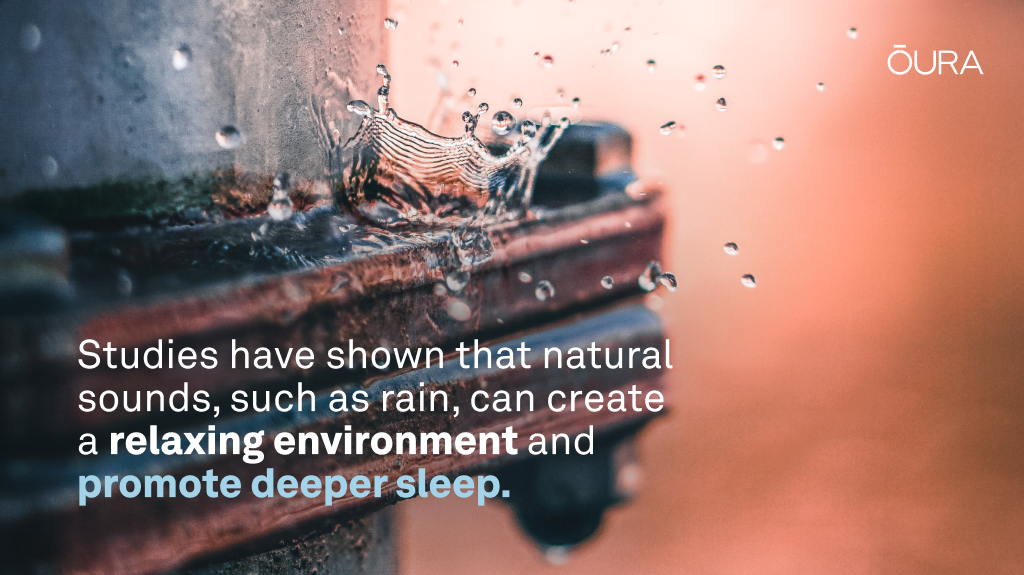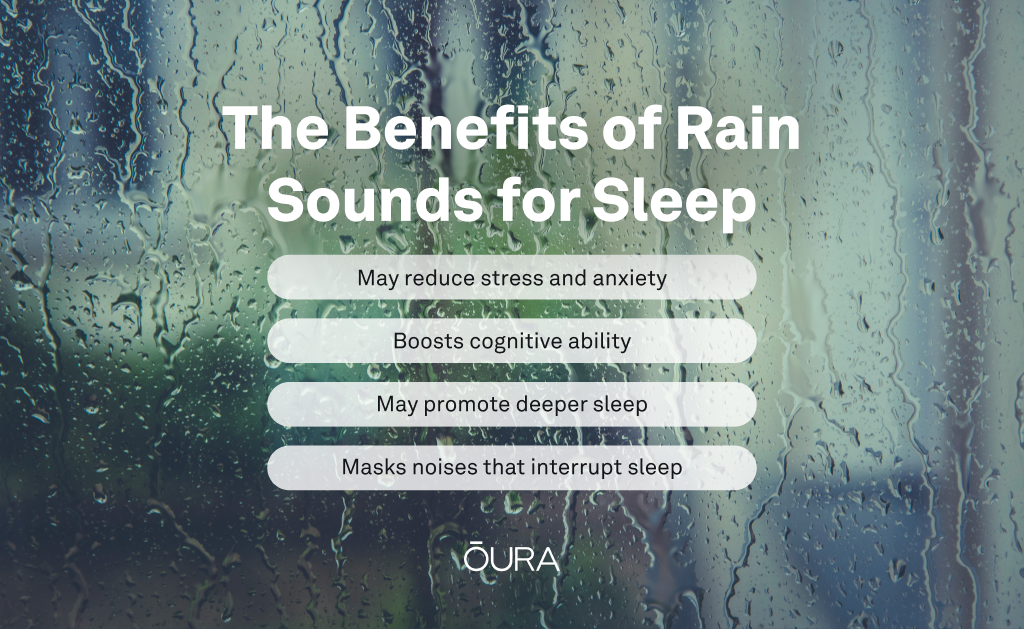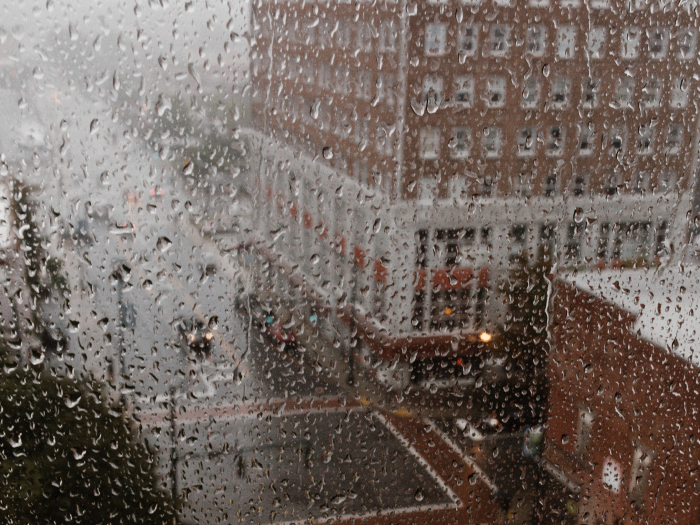Who doesn’t love that cozy feeling of snuggling up under a blanket — perhaps with a cup of tea and a good book — while the pitter-patter of rain taps gently on the window? It’s a feeling that many people love. The Welsh even have a word to describe it — hiraethwr, which roughly translates as “feelings of nostalgia while listening to the sound of rain from indoors.”
It’s hardly surprising that such an iconically relaxing sound is one of the most popular sleep soundtracks — even when it’s not raining outside. Soft rain sounds are a type of green noise — the term used to describe nature sounds, such as waterfalls, ocean waves, babbling brooks, and rustling leaves.
Unlike white noise, which contains all sound frequencies, green noise uses a consistent mid-level frequency to produce a steady, flat sound — such as rain.
But what is it about rain that makes it so relaxing — and can water sounds really help you get a better night’s sleep? Let’s dive into the science to find out.
Oura members can find an ever-growing library of guided audio sessions for meditation, sleep, and more — with rain sounds as a soundscape option — in the Explore Tab in the Oura App. Or try an “unguided session” accompanied by soothing rainfall noise as you meditate, breathe, or simply relax.
READ MORE: Try Oura’s Guided Sleep Meditations for Deep and Restful Sleep
Why Do I Find Rain Sounds So Relaxing?
Part of the reason we find rain sounds so relaxing has to do with how your brain works. The brain processes sound differently when we’re asleep than during waking hours. New research has found that although your brain remains responsive to sounds during sleep, the reduced alpha-beta waves do not allow it to focus on or identify the sound, meaning no conscious awareness of it occurs.
However, the brain is constantly analyzing sounds during sleep to monitor for potential danger. Another study found that the processing of sounds during sleep is similar to when we’re awake but lacks the feedback signals that interpret the sounds.
Therefore, whether you’re listening to a guided meditation, relaxing music for sleep, or rain sounds, your brain is listening and processing the input without you being consciously aware of it. This means that the type of sounds you listen to can affect the quality of your sleep.
When you’re asleep, sudden, loud noises can wake you by activating the threat-activated vigilance system. Since you perceive the repetitive, rhythmic sound of rain as a non-threatening sound, it doesn’t disturb your sleep.
READ MORE: What Is Green Noise? How Does It Help You Sleep Better?

Studies have shown that natural sounds, such as rain, can create a relaxing environment and promote deeper sleep. For instance, in a study published in the Journal of Sleep Research, researchers found that exposure to nature sounds — including rain — reduced stress levels, and improved sleep quality.
The study involved 17 participants who listened to nature sounds for five consecutive nights while they slept. The results showed that they had significantly improved sleep quality, including more deep sleep and less wakefulness during the night.
Additionally, the low-frequency tones and steady rhythm of rain sounds may promote relaxation by helping the brain produce alpha waves, which induce feelings of calm.
There are also physiological reasons why our brains may associate the sound of rain with relaxation and sleepiness. For example, when it rains, the humid air contains fewer oxygen molecules, which can make us feel more tired.
Rain also releases negative ions, which studies have found can contribute to feelings of relaxation and well-being, and there is some evidence that they may also help regulate sleep patterns and mood.
Oura members can track the effects of different sleep sounds using their Sleep Score contributors to experiment and see which sounds give them the best quality of sleep.
The Benefits of Rain Sounds for Sleep
Here are a few reasons why you might want to “let the rain sing you a lullaby,” as Langston Hughes once wrote.
Rain Sounds May Reduce Stress and Anxiety
Research suggests that listening to nature sounds — such as gentle rain — can reduce stress and anxiety, which in turn helps produce feelings of calm and relaxation that can be conducive to sleep.
Another study found that nature sounds activate the parasympathetic nervous system — the part of the nervous system responsible for the relaxation response that helps us fall asleep.
Rain Sounds Boost Cognitive Ability
A study of university students found that listening to rain sounds while solving arithmetic problems boosted their response times, suggesting that rain sounds can have a positive effect on cognitive abilities.
Rain Sounds May Promote Deeper Sleep
One study found that participants who listened to rain sounds had deeper sleep and were less responsive to sleep disruptions compared to when they slept without sound. This suggests that rain sounds may help you sleep more deeply and wake up less often during the night.
Oura members can track the effect of rain sounds on their sleep using the Nighttime Movement Feature or see how much time they spent awake.
RELATED: Restless Sleep? How to Reduce Tossing and Turning at Night
Rain Sounds Can Mask Noises that Interrupt Sleep
Whether it’s traffic, noisy neighbors, a nearby airport, or a snoring bed partner, there are plenty of noises that can interfere with your sleep.
However, by providing a consistent background noise, rain sounds can help create a more peaceful sleeping environment.

Your One Minute of Rain
Ready to try rain sounds for better sleep? Here’s a one-minute sample of rain sounds, similar to the one available to Oura members in the Oura App, specifically designed to help you relax, unwind, and get a restful night’s sleep.
If you’re an Oura member, you can also track your Sleep Contributors, such as sleep latency (i.e., how long it takes you to fall asleep), sleep efficiency, and restfulness, to see how rain sounds and other factors affect your sleep quality over time.
READ MORE: 6 Surprising Bad Sleeping Habits and How to Break Them (For Good)










